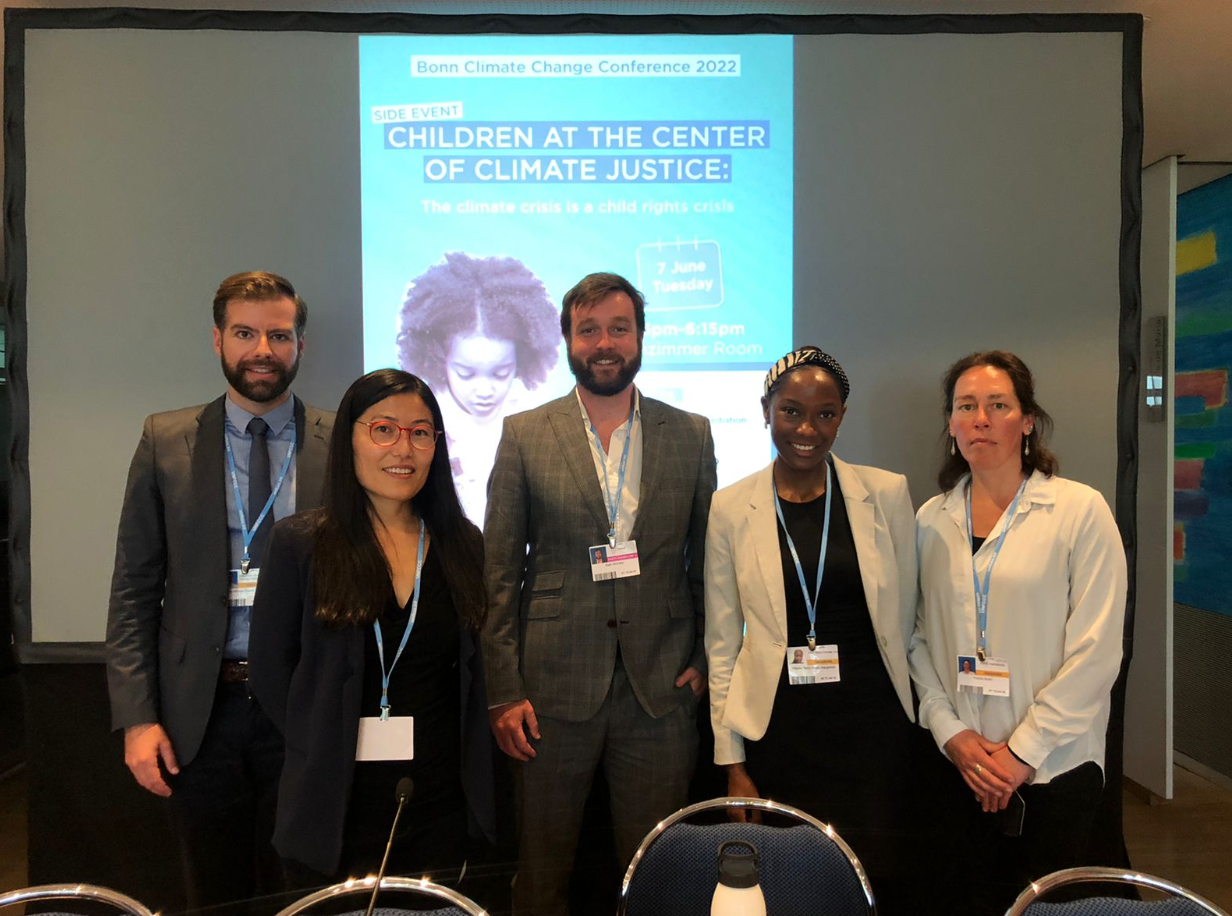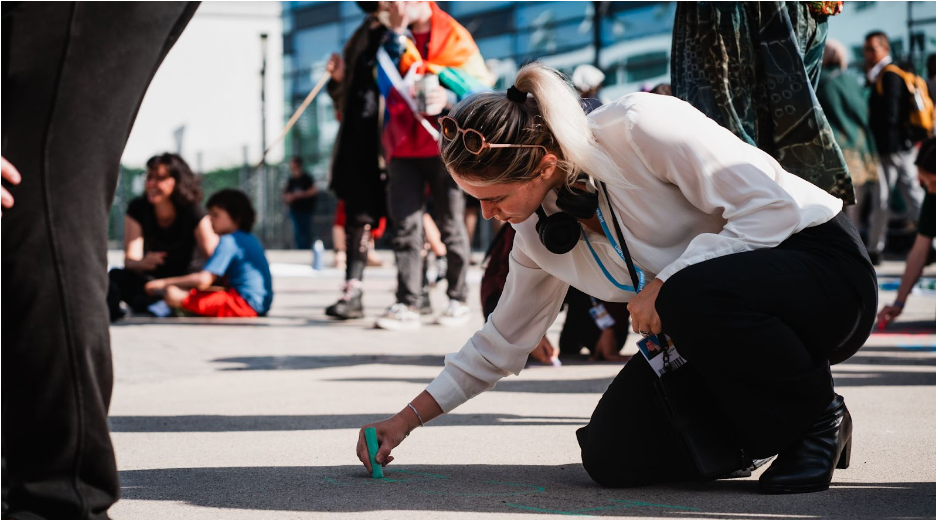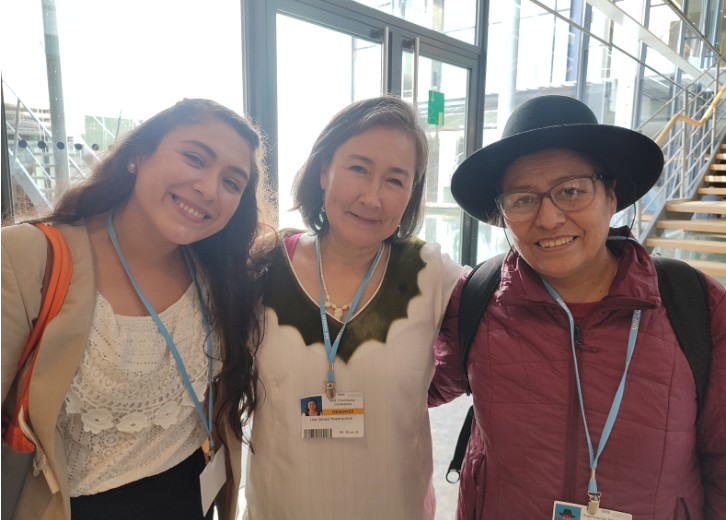Reflections on Finance, Oceans, and Indigenous Leadership from the Bonn UN Climate Change Conference (SB56)
The 56th Session of the United Nations Climate Conference in Bonn (also known as SB56), Germany has come to a close. SB56 followed the publication of the Intergovernmental Panel on Climate Change (IPCC) Report, the world's most dire report on the climate crisis to date that was deemed "an indictment of failed climate leadership" by UN Secretary-General António Guterres. As youth activists, we hoped the findings of the reports would inspire countries to build bridges and make the transformative decisions necessary to secure a climate just future. Unfortunately, we left SB56 with more distrust and disagreement than when it began, without any concrete outcomes, and with sadness as we watched our lives be negotiated with, yet again, as if they are nothing more than a profit margin.
As we look toward COP27 following the lack of any outcomes at SB56, we continue to urge parties to remember they're negotiating our future, our lives, and the health of our shared environment. So, what actually happened at the SBs? Find reflections and accounts of the events from our team members below:
Natalie Mangondo (Zimbabwe)
Climate Finance Specialist and Volunteer for the NDC Equity Tracker
Natalie Mangondo participating in a UNICEF, CERI, and Alana Institute side event ‘Children at the Center of Climate Justice’
The 2022 Bonn Climate Change Conference was a truly transformational time to send Care About Climate’s first delegation. It was held in the backdrop of a three-year in-person hiatus due to the COVID-19 pandemic, with the world focused on recovering from the pandemic, the Conference of the Parties having finalised the Paris rulebook and a marked shift to implementation of the provisions of the agreement. The shift in focus towards implementation occurred in parallel with taking stock of progress with the first technical dialogues of the inaugural Global Stocktake being held.
Even though there was a marked shift in theory, in practice issues of inequity, and inefficiency which have plagued these convenings since their inception marred true progress. Nowhere was this more evident than through developing countries demanding a financial facility for loss and damage at COP27. Finance as a means to the fast-paced and large-scale collective action needed to be taken permeated all discussions from loss and damage to action for climate empowerment to the Global Goal on Adaptation to the New Collective Quantified Goal on Climate Finance itself.
With the Paris rulebook finalised, and COP27 in less than 5 months, the Bonn Conference was meant to be a shifting of gears, however it seemed to be a convening which delayed any real negotiations to the COP. When we reconvene in Sharm el-Sheikh, these will need to be taken up, as we take stock, and face major barriers as marginalised and most affected groups to engage in a meaningful way. One thing to note is that the group which is most vulnerable to the impacts of climate change, with the least responsibility, and least resources to respond to or recover from the impacts of climate change was noticeably absent from these proceedings, children. As we do shift gears to COP, we need to look beyond these convenings to radically collaborate with both state and non-state actors, and be allies to the most vulnerable amongst us, because that is where the action we need to take to address this existential crisis will be taken.
Lou Collin (France)
20 year-old Volunteer for the NDC Project and COP27 Task Force
Image Caption: The participants of the climate strike organized by Fridays for Future in front of the SB56, were given chalk to write their demands and expectations they had for the SB56.
SB56 was my first United Nations and international climate negotiation experience. I came here with no expectations, but left disappointed.
As coined by the COP27 Presidency, the theme of COP27 is implementation. Nothing I saw during SB56 at Bonn pointed toward it. I saw countries defending their own positions and hardly compromising. I saw a very sharp gap between developing/poor countries and rich/developed countries. The experiences I had that reflect this in action are as follows:
I had the opportunity to attend informal meetings, also called bilaterals, with Switzerland, France, Saudi Arabia and the UK negotiators. From these discussions, arose that developing countries need more financing and not to be burdened further by this crisis that is the accountability of the Global North. On the other hand, developed and rich countries are very shy about giving more money and want everyone to contribute to solving the crisis.
One sentence I heard during this week that stuck with me was: “We enhance our NDCs , but the GHGs emissions continue to rise, because we fall short on implementation”. This is the bottom problem of these sessions. They push for always more texts, more agreements, and bolder NDCs, which takes time to write and get consensus on, meanwhile they continue to ignore or insufficiently implement their previous commitments. We need countries to connect with their ministries that are the ones dealing with implementation. We need to employ more people to scale up the implementation and give them more resources.
The principal topic of the SB was finance. I understand the importance of finance, especially for developing countries, but all I heard for 10 days was how to turn the land, forest and ocean into an economic activity, with words like trade offs, blue carbon, and carbon offsetting being thrown around. This reinforces humanity's exploitative relationship with nature and, like the negotiator of Bolivia said, we need to start having a holistic approach to the problem, with respect to the living entities surrounding us and not this extractivism mindset.
For example, during the first ever Dialogue on Ocean and Climate Change. I sat there for 4 hours, listening to countries make statements about how great they are doing, instead of engaging in meaningful conversation with each other. I heard blue carbon, over and over again, but not once did I hear them talk about real, pressing issues like overfishing and bottom trawling. Exasperated, I signaled my desire to speak up as an ‘observer NGO’ and reminded them that we need more and better protected marine protected areas, and talked about these urgent issues mentioned above - no one answered me. Later in the day, a negotiator from a European developed country told me that they appreciated my intervention. While I appreciated the sentiment, I was frustrated that they didn't take advantage of showcasing this support during the Dialogue. I tried to ask why and was met with the classic response of lobbies, finance, and the need to be politically correct. The next day, the French negotiator in charge of the ocean sector confessed she started sweating when I said overfishing and bottom trawling because they hadn’t prepared a statement about it. France didn’t have a position on this. Saying I was shocked, is an understatement. How can a country like France that has access to the Mediterranean, which is the world’ most overfished sea, not have a position on this, at the Ocean and Climate Change Dialogue at the United Nations Climate Change conference?
I left Germany under the impression that only small NGOs were speaking freely in these spaces. We are the only ones asking the real questions despite having no power of negotiations, especially young people, and the ones most likely to lead on implementation. Yet, even when negotiators highlighted the need to involve local actors for implementation, they didn't stick around to hear our perspectives and never responded to our statements. To make the urgent change we need, NGOS and other stakeholders must have a formal negotiating role.
Peeking through the disappointment, is one glimmer of hope brought forth by the numerous young people present at SB56 with beautifully thoughtful ideas and contagious energy. It’s time to give us a seat at the table.
Barbara Beltran Torres (Peru)
Indigenous Peoples Advocate and Leader of Educator for Sustainable Development in Latin America and Europe
Image Caption: Barbara Beltran meeting indigenous women leaders from Peru and Nepal
It was a pleasure for me to participate as a delegate for Care about Climate at the UN Climate Change Conference in Bonn this year. While I had the opportunity to attend numerous events, the events focusing on indigenous leaders were particularly meaningful to me since I have been working with different indigenous communities in Peru for my Green Dreams project for two years. I had the opportunity to discuss with them, understand the work they are doing, and the claims they are asking for, especially in vulnerable areas, such as the Amazonas where part of my family comes from.
On the first day I participated in the “SBSTA - IPCC Special event: Unpacking the new scientific knowledge and key findings in the Working Group II contribution to the Sixth Assessment report: Impacts, Adaptation and Vulnerability.” In this session, I had the chance to talk about current issues and violations against human rights among indigenous communities in Peru. Further, I shared a call for more urgent protection and fair policies for these communities that are already suffering from climiate change such as forced migration, loss of jobs, loss of food, indiscriminate logging, illegal extraction, lucrative destruction, oil spills, murders, among others.
Additionally, I was able to share claims of indigenous representatives and presented part of the results of my extensive academic research calling for the inclusion of indigenous peoples as equally impacted compared to nature. However, it seems that the IPCC has a different approach to adaptation and mitigation of climate change by mainly addressing and highlighting the importance of protecting endangered species, trees, and rainforests, but not the people who have been living in these spaces, respecting these spaces, and stewarding nature for centuries. I hope this challenge will be discussed more in the lead up to and at COP27 in Egypt.



